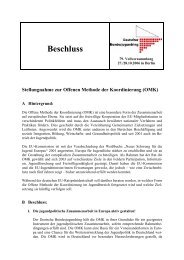National Quality Standards Framework (NQSF) - Homeless Agency
National Quality Standards Framework (NQSF) - Homeless Agency
National Quality Standards Framework (NQSF) - Homeless Agency
You also want an ePaper? Increase the reach of your titles
YUMPU automatically turns print PDFs into web optimized ePapers that Google loves.
3.3 <strong>Standards</strong> 3.3.3 Progression Section 1: Youth Work Practice and Provision<br />
All youth work engages proactively with young people, offering strategies and supports that enable young people to progress and achieve.<br />
The indicators below describe what should be in place in support of this standard at each point along the scale of attainment. Please consider these indicators in relation to your organisation and<br />
insert P beside the appropriate indicator. You may add any other indicators you think are appropriate.<br />
Absent<br />
P Acquiring P Achieved P Advanced P<br />
1. Practice does not respond to the needs of<br />
young people.<br />
2. No strategies for engaging young people<br />
are in place.<br />
3. No supports for engaging young people<br />
are in place.<br />
1. Practice mostly responds to the needs<br />
of young people.<br />
2. A number of strategies for engaging<br />
young people are in place.<br />
3. A number of supports for engaging<br />
young people are in place.<br />
1. Practice is proactive and responsive to<br />
the needs of young people.<br />
2. A range of effective strategies for<br />
engaging young people are in place.<br />
3. A range of effective supports for engaging<br />
young people are in place.<br />
1. Practice is proactive, responsive and<br />
continuously developing.<br />
2. A range of effective and innovative<br />
strategies for engaging young people are<br />
in place.<br />
3. A range of effective and innovative supports<br />
for engaging young people are in place.<br />
4. Progression does not happen. 4. Progression is unstructured. 4. Progression is structured. 4. Progression is structured and promoted.<br />
5. No emphasis on young person’s learning. 5. Limited emphasis on young person’s<br />
learning.<br />
5. Emphasis placed on young person’s<br />
learning.<br />
5. Young person’s learning is central to<br />
service provision.<br />
6. Achievement is not recognised. 6. Achievement is somewhat recognised. 6. Achievement is recognised and recorded. 6. Achievement is recognised, recorded and<br />
rewarded.<br />
Add any other indicators below:<br />
23<br />
In the relevant spaces below, please describe the evidence your organisation has in place in relation to the above indicators:<br />
Having considered the above, identify a position on the scale of attainment that best reflects your organisation’s position in relation to this standard (mark P on a point on the scale below).<br />
If you think your organisation is at different points on the scale of attainment in relation to the various indicators, choose a point on the scale that, overall, best reflects this position.<br />
Absent Acquiring Achieved Advanced<br />
Why have you chosen this point on the scale?
















